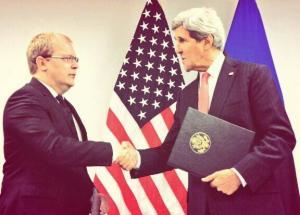At the sidelines of the NATO ministerial meeting that took place in Brussels in December, Estonian Foreign Minister Urmas Paet and US Secretary of State John Kerry signed a landmark agreement regarding cyber cooperation that, except for a few articles recycling press release text, went largely unheeded by both the general public and the (cyber) security community. Taking more than a year to negotiate, the “US-Estonian Cyber Partnership Statement” serves not only to highlight Estonia’s prominent role in today’s international cyber security policy arena but also as an indication of the way forward in terms of global collaboration in the cyber field.
The cyber partnership between Estonia and the United States is the first of its kind, marking the beginning of a trend of bilateral cooperation at a time when the world’s states are becoming increasingly polarised in terms of their approach to information technology in general and the internet in particular. While there is no shortage of international organisations that have come to play some role in this sphere, including and especially the UN, none have been able to broker a common set of “rules of the game” under which all countries can interact with each other with some degree of predictability, stability and shared rationale.

The advent of the cyber age, therefore, has brought about a new and insecure dimension to international relations. The countries of the world, in broad strokes, have aligned themselves along a spectrum with two extremes. On the one hand are the liberal democracies, which see cyberspace and the opportunities it presents as an economic tool to encourage efficiency and development as well as an instrument to promote the free exchange of ideas. On the other hand there are the “cyber-sovereignty” advocates (most prominently China and Russia) who fear the influence of the virtually unlimited access to information and ideas that it provides as a threat to their state, economy, culture and way of life and seek a “balkanised” internet with state-level restrictions to content access. Given this polarisation, which shows no signs of availing itself to a global “grand compromise”, a security dilemma has emerged in which countries from both sides are mobilising increasing resources and manpower and acting in hostile ways through either intelligence agencies or non-state proxy organisations. This process is counterproductive and, in the long run, leads to greater overall system insecurity.
This is exactly where the unprecedented Estonia-US partnership comes in. At a time when there is so much insecurity, especially in the wake of the well-publicised Edward Snowden [the NSA whistleblower] revelations as well as the attention-grabbing instances of Chinese subterfuge, it is increasingly important to encourage and incentivise trust, collaboration and stability. The ambitious agreement between Estonia and the US does exactly that. It addresses virtually all of the important elements that are grouped under the umbrella of cyber policy, including but not limited to:
- Defending the exercise of human rights such as freedom of expression online
- Protecting critical infrastructure such as power plants and water systems
- Combating the prevalence of cybercrime through law enforcement cooperation
- Enhancing cyber defence through information sharing and joint exercises
- Optimising research, development and entrepreneurship through academic exchanges
- Instilling confidence in democratic e-governance through capacity building in third countries
- Promoting the applicability of existing international law and norms of behaviour in cyberspace
- Encouraging the input of civil society to ensure a multi-stakeholder approach to internet governance
It remains to be seen how this multidimensional and enterprising partnership will be implemented in practice. However, its importance cannot be underestimated. Since no comprehensive global accord seems to be in sight, two-sided agreements between like-minded partners appear to be by far the most fruitful way forward. And, while talks about such broad-based agreements have also begun between the US and global economic heavyweights such as the UK and South Korea, it is especially telling that Estonia was the first country to successfully conclude one with the United States, who undoubtedly remains the world’s premier political, economic and military power. This just goes to show that the following quotes from the US State Department and Estonian Foreign Ministry were more than just diplomatic niceties; they were matters of established and indubitable significance:
US: “Estonia is a key ally of the United States and a recognised leader on issues of cyber security and internet freedom.”
Estonia: “Estonia’s security is better than ever before, and this is largely thanks to US support.”


Well said. One can only hope that this agreement sets a positive precedent eventually leading to a global accord in the distant future.
Hello Patrick, I really would love to study Cyber security as a graduate degree in Estonia but I am an African (Nigeria) please how can I go about it?